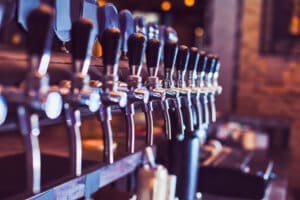Carbon dioxide (CO2) and nitrogen (N2) are two gases commonly used to dispense beer on tap. While both gases serve the same purpose, they have different effects on the beer, resulting in different tastes and mouthfeels. Here’s a summary of the differences between CO2 versus nitro taps for beer and which types of beer are often served on nitrogen.
 The History of Carbonation
The History of Carbonation
The discovery of using carbon dioxide (CO2) to carbonate beer is attributed to Joseph Priestley, an English chemist, who made the discovery in 1767. Priestley accidentally infused water with carbon dioxide while suspending a bowl of water above a beer vat at a brewery in Leeds, England. He found the resulting carbonated water to be refreshing and published a paper entitled “Impregnating Water with Fixed Air” in 1772. This marked the beginning of artificially carbonated beverages. It is worth noting that the carbonation process for beer has evolved over time. Initially, many alcoholic drinks, including beer, were naturally carbonated through the fermentation process. However, in the early 1740s, William Brownrigg produced artificial carbonated water by using carbon dioxide taken from mines. This laid the foundation for the artificial carbonation of beverages. The commercialization of carbonated beverages, including beer, took place in 1786 when Jacob Schweppes developed a process to manufacture bottled carbonated mineral water based on Priestley’s discovery. This marked a significant milestone in the history of carbonated beverages. On the other hand, nitrogen is a naturally occurring gas that is less soluble than carbon dioxide. The blending of nitrogen and carbon dioxide, known as “beer gas” or “nitro blend,” was discovered in the 1950s by a British scientist named Michael Ash. This blend of gases became the key to creating the perfect pint of Guinness and is now widely used to dispense nitrogenated beers. The exact ratio of nitrogen to carbon dioxide in beer gas varies depending on the type of beer being dispensed.
The comparison: CO2 versus Nitro
Carbon Dioxide (CO2)
Carbon dioxide is the most commonly used gas for dispensing beer on tap. It is a naturally occurring gas that is produced during the fermentation process. CO2 is highly soluble, meaning it is easily absorbed by liquids such as beer, soda, and water. When CO2 is used to dispense beer, it creates small bubbles that rise to the top of the glass, resulting in a crisp and refreshing mouthfeel.CO2 is typically used to dispense lighter beers such as lagers, pilsners, and pale ales. These beers are often carbonated to a higher level, resulting in a more effervescent mouthfeel. CO2 is also used to dispense stouts and porters, but these beers are typically carbonated to a lower level to create a smoother mouthfeel.
Nitrogen (N2)
Nitrogen is another gas that is commonly used to dispense beer on tap. Nitrogen is less soluble than CO2, meaning it is not easily absorbed by liquids. When nitrogen is used to dispense beer, it creates smaller bubbles that rise more slowly to the top of the glass, resulting in a creamy and smooth mouthfeel. Nitrogen is typically used to dispense darker beers such as stouts and porters. One of the most well-known beers often served on nitro continues to be Guinness. These beers are often served at a lower carbonation level to create a smoother mouthfeel. Nitrogen is also used to dispense some lighter beers, such as cream ales and blonde ales, to create a creamy and smooth mouthfeel. In recent years, nitrogen has also gained popularity in the world of coffee. Nitrogen-infused coffee, also known as “nitro coffee,” has a creamy and smooth mouthfeel similar to nitrogenated beer. This trend has further expanded the use of nitrogen in the beverage industry.
Learn more about beer with a visit to The Growler Guys.
Explore the growing variety of beers in one taproom, The Growler Guys. Each of our locations carries the best local varieties, from the palest ales to the darkest stouts, along with ciders and kombucha. Our friendly staff is happy to walk you through the characteristics of every style to help you discover your personal favorites. Take home the beers you love best in a growler to share with family and friends. View our online tap list to learn about the selections currently available at a location near you!

 The History of Carbonation
The History of Carbonation
Reader Interactions